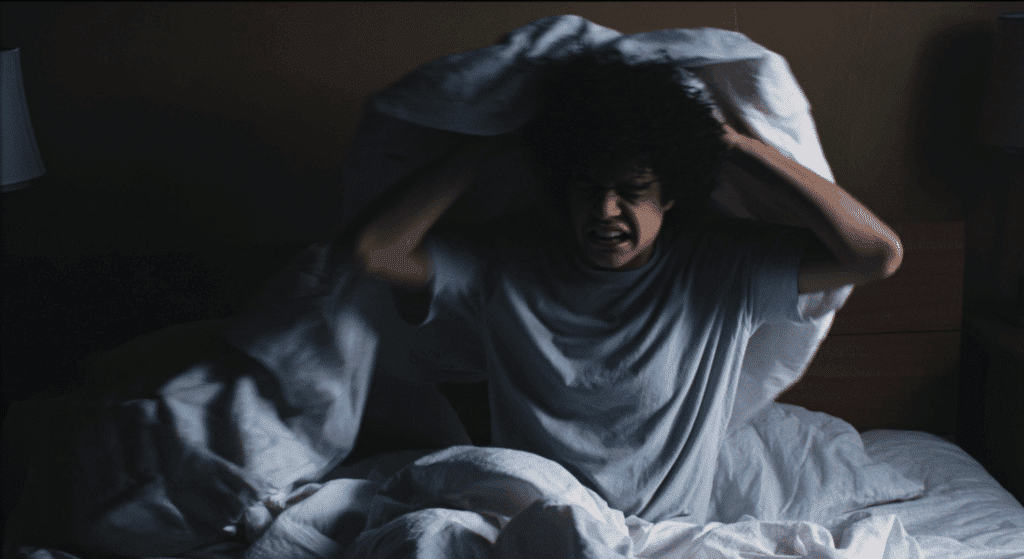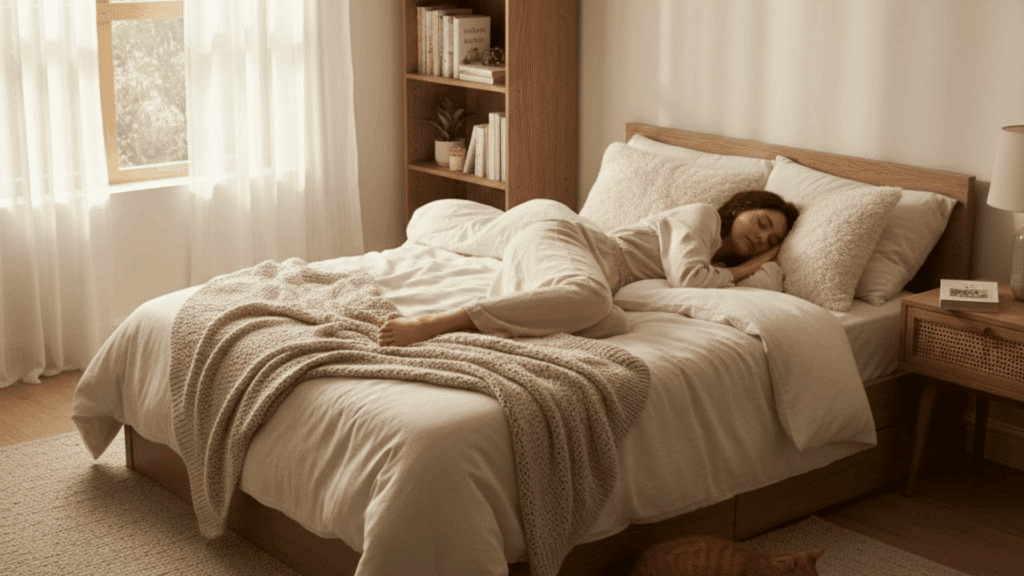I’ve woken up in the middle of the night feeling way too hot, blankets tossed off, skin sticky, and completely thrown off. I used to think it was just the room or the weather, but it kept happening.
That’s when I started asking myself, Why do I get hot when I sleep, even when everything seems normal. Over time, I learned it wasn’t just one thing. It had to do with my body, my habits, and even what I was sleeping on.
If you’re dealing with the same thing, this guide will help you figure it out. You’ll learn what your body does during sleep, why the heat builds up, and how your environment might be making it worse.
I’ll also walk you through changes you can make to stay cool and comfortable at night.
How Your Body Regulates Temperature During Sleep
When you go to sleep, your body cools down on its own. This drop in temperature helps your body and brain relax and rest properly.
This cooling is guided by your circadian rhythm, which is your body’s natural clock. It tells your body when to sleep and when to wake up. The hypothalamus, a part of your brain, works like a thermostat.
It helps your body lower its core temperature by about 1 to 2 degrees. That small change makes it easier for you to fall asleep and stay asleep.
Still, there are times you might feel too warm. Your room might be too hot. Your blankets or pajamas might hold in too much heat. Eating too close to bedtime can also raise your body heat. Stress or changes in hormones can make things worse.
Letting your body cool down naturally can help you sleep better and feel more rested in the morning.
Why Do I Get Hot When I Sleep?
If you have the question of “why do i wake up hot in the middle of the night?” Remember that waking up sweaty or too hot at night can be frustrating. Even when the room doesn’t feel warm, your body might be acting like it’s stuck in a heatwave. So what’s going on?
Let’s see what’s normal, what’s around you, what you do during the day, and when it might be something more:
1. Normal Physiological Factors

Some heat at night is normal. Your body changes as you sleep, and these changes can affect your temperature.
During REM (Rapid Eye Movement) sleep, when most dreaming happens, your body doesn’t release heat as well. Instead, it holds onto it. Your arms and legs may not give off as much heat, so warmth stays trapped in your core. This can make you feel hotter even though your body is trying to cool down.
Hormonal Cycles
Hormones play a big role in how warm or cool you feel.
- Estrogen and progesterone affect your body temperature. These hormone changes happen during periods, pregnancy, and menopause.
- Your thyroid hormones matter too. If your thyroid is overactive, your body may stay warmer even while you’re resting.
Metabolic Rate Differences
Some people just run hotter. That means your body burns energy faster than others. A faster metabolism can make more heat, even while you sleep. You may need fewer blankets than someone else to feel comfortable.
2. Environmental Triggers That Raise Your Body Temperature

Your room, your mattress, and even how the air moves can change how hot you feel at night.
If your room is too warm, it’s hard for your body to cool down. The best bedroom temperature for sleep is between 60 and 68°F (15 to 20°C). Anything above that can cause overheating.
Mattress and Bedding Materials
Some materials trap heat more than others.
- Memory foam and polyester hold in warmth. They don’t let air move freely.
- Cotton and linen breathe better. They let air move and help keep you cooler.
If you wake up sweating, your bed might be the reason. Try switching to lighter materials.
Room Ventilation, Humidity, and Air Circulation
Still air can feel heavy and warm. Try these tips to improve airflow:
- Keep a fan running at night.
- Use a dehumidifier if your room feels damp.
- Crack a window open, even slightly, to let air move.
Better airflow can help your body release heat while you sleep.
3. Lifestyle Habits That Make You Sleep Hotter

What you do during the day (and right before bed) can change your temperature at night.
Exercise raises your body heat. If you work out right before bed, your body might still be hot when you lie down. It’s better to finish workouts at least two to three hours before sleep.
Alcohol or Caffeine Intake Before Sleep
These drinks don’t just affect your sleep, they can make you warmer too.
- Alcohol might make you sleepy, but it can cause body heat to rise later in the night.
- Caffeine speeds things up inside your body. That includes your heart rate and temperature.
Try cutting these out a few hours before bed.
Late-Night Meals or Stress Before Bed
Eating late makes your body work harder to digest. That raises your inner temperature.
Also, stress hormones can make you feel warmer. If your mind is racing when you go to bed, your body may be acting like it’s still in “go” mode—even if you’re lying down.
4. Medical Causes of Overheating or Night Sweats

Sometimes feeling hot at night isn’t about your habits or your room. It could be your body’s way of telling you something else is going on.
Night Sweats and Hormonal Shifts
Menopause is one of the most common causes of night sweats in women. Sudden hot flashes can wake you up soaked.
Other possible causes:
- Infections like the flu or other illnesses
- Low blood sugar, especially for people with diabetes
- An overactive thyroid (hyperthyroidism)
Sleep Apnea and Anxiety
Sleep apnea blocks airflow while you sleep. Your body wakes up over and over to fix it. This can cause your heart rate and body temperature to spike.
Anxiety and panic attacks can have a similar effect. Even in your sleep, your body can react as if it’s under pressure, raising your heat.
Medications That May Trigger Overheating
Some medicines can cause night sweats or body warmth. These may include:
- Antidepressants
- Steroids
- Medicines for high blood pressure
If you’ve started a new prescription and you’re overheating at night, it might be worth talking to your doctor.
Do Men and Women Sleep Hot for Different Reasons?
Yes, men and women can sleep hot for different biological reasons. One big difference is hormones. Women’s body temperature is affected by estrogen and progesterone, which rise and fall during periods, pregnancy, and menopause. These changes can lead to night sweats or sudden heat spikes, especially in the second half of the night.
During menopause, hot flashes become more common and often hit during sleep. Pregnancy also raises body temperature due to hormonal shifts and increased blood flow.
Men usually have more muscle mass, which means they naturally produce more heat—even when resting. This can cause men to feel warmer during sleep, especially if the room or bedding traps that heat.
So while both men and women can overheat at night, the reasons often come down to how hormones and body composition affect temperature control during sleep.
How to Stay Cool While Sleeping
If you often wake up sweaty or too hot, a few simple changes can help your body stay cool through the night. These tips can make a big difference in how well you sleep.
- Set your bedroom temperature between 60–68°F for cooler sleep.
- Use breathable sheets like cotton or linen, not polyester.
- Swap heavy comforters for a light blanket or cooling cover.
- Sleep with a fan or keep a window slightly open for airflow.
- Take a lukewarm shower before bed to lower your body heat.
- Avoid exercise, alcohol, or caffeine close to bedtime.
- Don’t eat heavy meals late in the evening.
Can Stress or Emotions Make You Sleep Hotter?
Yes, stress and emotions can absolutely make you sleep hotter. When you’re feeling anxious, worried, or overwhelmed, your body reacts – even while you’re sleeping. Stress activates your nervous system, which can raise your heart rate and body temperature. This response is your body’s way of preparing for action, even though you’re just trying to rest.
Emotional stress can also trigger the release of hormones like cortisol and adrenaline. These chemicals make it harder for your body to cool down at night. You might not notice it during the day, but at night, it can lead to tossing, turning, and waking up too warm.
If you’ve been feeling more stressed than usual and notice you’re sleeping hotter, the two could be connected. Taking steps to relax before bed—like deep breathing, journaling, or turning off screens can help lower your stress and make it easier for your body to cool down naturally.
When to Talk to a Doctor About Night Sweats or Overheating
If you wake up sweating often and it’s not due to a warm room or heavy bedding, it may be time to talk to a doctor. Signs to watch for include chronic night sweats, feeling tired all the time, or losing weight without trying.
Doctors can run simple tests to check for causes like thyroid problems, infections, or hormone changes. These tests are usually quick and easy.
Most of the time, the issue is common and treatable. You’re not alone, and getting help can lead to better sleep and peace of mind. It’s always okay to ask questions when something doesn’t feel right with your body.
Conclusion
Even small changes in your habits or bedroom setup can help your body release heat more easily. Staying cool at night supports deeper, more restful sleep.
I’ve learned that getting hot at night isn’t just about heavy blankets or a warm room. It can be your body’s natural sleep cycles, hormone shifts, or even habits like late meals or workouts. Once I started noticing the patterns, it became easier to manage.
Now it’s your turn. Think about what might be heating you up during the night and try out a few of the tips you read here. If you’ve been asking, Why do I get hot when I sleep, you should now have a better idea of what’s going on. Staying cool can help you sleep more deeply and wake up feeling better.
Don’t stop here, there’s more to learn. Check out other blogs for more simple, helpful advice that can make a real difference in your sleep and comfort!









